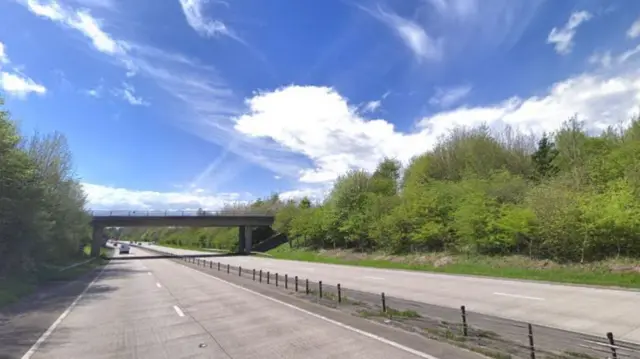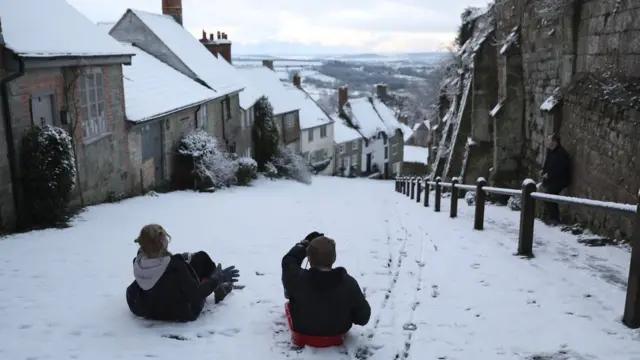Man and woman 'had been dead for weeks'published at 15:48 GMT 26 January 2021
The deaths of a man and women in Upton are not being treated as suspicious, police say.
Read MoreHuge numbers of visitors flock to beaches in Dorset and Hampshire
BCP Council declares 'major incident' in response to the numbers of people
People from as far away as the midlands have come for the day to the coast
The scenes have been described as a "complete breakdown of decent, normal behaviour"
Reports of anti-social behaviour, illegal parking, piles of litter, overnight camping and gridlock
A councillor said she was verbally abused and spat at as she directed traffic.
Dan Kerins, Andre Rhoden-Paul and Stephen Stafford
The deaths of a man and women in Upton are not being treated as suspicious, police say.
Read MorePolice fine a motorist for refusing to leave Portsdown Hill until he had finished his takeaway.
Read MoreA series of winter storms across the USA are expected to bring significant snow in the days ahead as well as torrential rain and the potential for tornadoes.
Read MoreOn the coast, two worlds collide. Coasts are the most dynamic and challenging habitats in the ocean - that brings great rewards but also great danger. The extraordinary animals that live here must find ingenious ways to cope with two very different worlds.
This episode is a rollercoaster ride of heart-stopping action and epic drama, peopled with characters from the beautiful to the bizarre. We meet fish that live on dry land and puffins that must travel 60 miles or more for a single meal, and witness a life-and-death struggle in a technicolour rock pool.
In a secluded cove in the Galapagos, sea lions feast on 60kg tuna. It should be impossible - tuna are usually far too fast for sea lions to catch. But here the sea lions club together to herd their prey inshore. Once trapped in the shallows, these huge fish are easy pickings.
As the tide recedes in Brazil, lightfoot crabs leap from rock to rock, desperately avoiding the water - their lives depend on it. Moray eels launch themselves from rock pools, jaw gaping. Then octopuses, too. Both crawl across dry rock to set their ambush. Elsewhere, the ever-changing tides create rock pools. But these temporary worlds are a battleground. Predatory starfish turn a magical garden into the stuff of nightmares.
All around the world, immense waves pound the shore, and this episode reveals some of the largest on the planet, over 30 metres high. Over millennia these forces carve exquisite coastal sculptures and cliffs that are home to huge colonies of seabirds. Puffins fly up to 30 miles out to sea to find food for their chicks. A father returns with one precious beakful of food... then pirates attack. Desperate dads must escape the faster and more aerobatic skuas before finally delivering a meal to their young puffling.
Meanwhile, in the remote Pacific islands lives the most terrestrial fish on the planet. It lives in miniature caves above the tide lines and uses its tail like a coiled spring to jump from rock to rock. A male tries to attract a mate, but waves are a constant hindrance. These are fish that seem to hate water!
Once a year, king penguins return to the cold Antarctic shores of South Georgia for a month-long moult. First they must cross the biggest wall of blubber on the planet - thousands of gigantic elephant seals. Then they face a month with no food, before they can return to their natural home, the chilly Antarctic seas.
The planet's coasts are changing fast as they are among the most built-up areas of the world. Just off the beaches of Miami, the largest gathering of coastal sharks on the planet can still be found. But today they must face the many challenges that come from our world too.
David Attenborough narrates a natural history of the oceans, examining the use animals from in and around the sea make of the constantly changing areas where land meets water.
From the open oceans, millions of sea birds are forced to come into land to breed. Sea eagles steal kittiwake chicks from their nesting ledges. Turtles lay their eggs in the sand and marine mammals haul themselves out to fight on the beaches. Sea lions emerge from the kelp to give birth, while killer whales come crashing in on the surf to snatch the sea lion's young.
Many places replace the snow with rain this week and any flurries stay on the hills
Read MoreWater is vital for the existence of all life. We live in a world that has it in abundance, yet most of this water is inaccessible to us. Ninety-seven per cent is sea water, too salty for terrestrial life to use. Just three per cent exists as freshwater, and almost all of this is locked up as ice or hidden underground. Only a tiny fraction can be accessed by life on land – and only then through the action of our planet’s weather. For weather is the force that distributes this freshwater around the world.
Every year, the sun evaporates 434 million billion liters of water from our oceans – 20 times the volume of all the Great Lakes of North America and Canada combined. This water rises into the sky, where it forms clouds, before falling as rain, sometimes thousands of miles away. Without the sun making rain, there would be no freshwater on Earth – and terrestrial life could not exist.
But where water is concerned, our planet is not created equal. Some regions experience extreme amounts of rain year round, some just a few millimeters, whilst others must deal with extreme shifts between wet and dry seasons. This distribution of freshwater around the globe has shaped the lives of animals all across the planet – and in doing so, it has given rise to an incredible diversity of species and habitats, from the driest desert to the lushest tropical rainforest.
It fell to -9C in Wales on Sunday and the Met Office warns of dangerous conditions into Tuesday.
Read MoreSouthend United sign centre-back Tyler Cordner on loan from Bournemouth until the end of the League Two season.
Read MoreFour ponies and three donkeys were killed in two collisions in the national park last month.
Read MoreIce pancakes are seen floating along a river in the Highlands.
Read More Image source, Google
Image source, GoogleA man is in a serious condition after his pick-up truck hit a bridge in Dorset.
It happened on the westbound side of the A35 at Puddletown at 09:00 GMT on Sunday.
The Toyota Hilux first hit the central reservation before crashing into a pillar near the Northbrook junction, police said.
The driver - a man in his 20s - was taken by air ambulance to Southampton General Hospital.
The A35 was closed for more than 10 hours for investigations and repairs.
Witnesses or anyone with dashcam footage are urged to contact Dorset Police.
Six centres close their doors amid treacherous conditions across the West Midlands.
Read MoreWeather for the Week Ahead
Snow covered parts of Bedfordshire, Hertfordshire, Buckinghamshire, Cambridgeshire and Northamptonshire.
Read More Image source, PA Media
Image source, PA MediaGold Hill in Shaftesbury was covered with snow
Snow and ice has caused "many reports of collisions" on Dorset roads, emergency services have said.
Several roads, including the A35 Puddletown bypass, were closed.
On the B3159 near Martinsdown, a car "snapped down" a BT pole.
Dorset and Wiltshire Fire Service said: "Within a minute of arriving we witnessed two further road traffic collisions."
Police said driving conditions were "difficult", particularly in the north of the county, and advised drivers to delay their journeys.
Weymouth turn the form table on its head as they win for the first time in 10 matches against high-flying Hartlepool.
Read MoreA cold weekend for many with snow for some, but turning milder and unsettled next week. Alina Jenkins has the details.
The tropical cyclone has made landfall in the southern part of the country. Earlier, it lashed Madagascar with torrential rain and damaging winds. Darren Bett has the details.